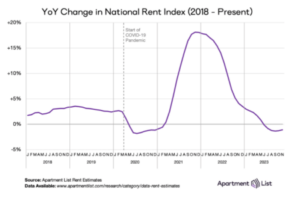
Simply Homes applies a more proptech-oriented approach by using an artificial intelligence-generated performance model to determine what each property will require to reach livability and in time, profitability.
The verdict is in — the old way of doing business is over. Join us at Inman Connect New York Jan. 23-25, when together we’ll conquer today’s market challenges and prepare for tomorrow’s opportunities. Defy the market and bet big on your future
A Portland, Maine-based company putting the iBuyer model to what some may call its highest and best use has secured $22 million in funding to further its intention, according to a post on Medium.
Simply Homes buys distressed single-family properties, renovates them as needed, and offers affordable leases to lower-income families, disabled individuals, fixed-income elderly and Section 8 program participants.
This is not an unheard-of model. It’s typically relegated to non-profit organizations and altruistic investors, and rarely able to be replicated at scale. Simply Homes, however, is applying a more proptech-oriented approach by using an artificial intelligence-generated performance model to determine what each property will require to reach livability and, in time, profitability.
In addition to revenue through its rent rolls, the company charges a transaction fee on each home and 3 percent for ongoing management. Buying homes as-is allows sellers to sell without the added burden of making it market-ready or worrying about the hassles of inexperienced flippers or aggressive investors who will do little in upkeep for the sake of cash flow. It also allows the transaction to move faster and with fewer in-escrow hurdles. It also favors the neighborhoods themselves by reducing the risk of gentrification, a trend that has lasting impacts on America’s collective home affordability.
Simply Homes leverages its web efficiencies and its AI models to deliver offers to sellers quickly in its current markets, which are currently Cleveland, Pittsburgh and Baltimore. Plans are underway for moving into the St. Louis market, according to the company.
The company is led by CEO and co-founder Brian Bagdasarian, who said in the post that his company is solving a problem most homebuilders can’t, primarily because they’re out of touch.
“We’re dedicated to resolving the affordability crisis for those facing the greatest housing instability,” Bagdasarian said. “While others have attempted programmatic home purchases in the past, no one operates in our market, providing well-maintained, affordable homes to those in dire need.”
Most builders are creating supply few can afford, according to Bagdasarian.
On Nov. 9, Motley Fool cited the Federal Reserve Bank of St. Louis in a report stating that “the median home sales price is $431,00. That’s up $14,900 from the previous quarter but down $37,000 from the previous year.”
Mortgage rates dipped under 7 percent last week, Inman reported. Demand for purchase mortgages was down 0.3 percent last week from the week before, after seasonal adjustments.
Regardless, According to an October survey of 3000 potential homebuyers conducted by Dig Insights, 80 percent of first-time homeowners said they would need a gift or personal loan to qualify this time around. Over 20 percent of the first-time buyers in the survey had a gross income of $100,000 or higher in 2022.
Now, apply those sentiments to America’s disadvantaged, and the Simply Homes model makes even more sense.
Simply Homes states that more than 80 percent of its tenants are single parents who “would need an estimated 150 hours a week to afford market-rate rent.”
“The median U.S. asking rent in October was $1,978, little changed (-0.3 percent) from a year earlier, but down 3.7 percent from the $2,054 record high set in August 2022. It fell 1.6 percent from a month earlier, which is typical for this time of year,” Redfin said.
Through the Housing Choice Voucher (HCV) program, also known as Section 8, families are obligated to pay no more than 30 percent of their rent.
Gutter Capital and Watchung Capital co-led the funding, the cash from which will be put toward advancing its AI efforts, specifically to develop virtual analysts for data interpretation.
The company was founded in 2020 and by year’s end is expected to managing 108 units, reporting a 50 percent revenue increase from last quarter.
- SEO Powered Content & PR Distribution. Get Amplified Today.
- PlatoData.Network Vertical Generative Ai. Empower Yourself. Access Here.
- PlatoAiStream. Web3 Intelligence. Knowledge Amplified. Access Here.
- PlatoESG. Carbon, CleanTech, Energy, Environment, Solar, Waste Management. Access Here.
- PlatoHealth. Biotech and Clinical Trials Intelligence. Access Here.
- Source: https://www.inman.com/2023/12/12/simply-homes-funded-22m-to-apply-ai-to-home-affordability-crisis/
- :has
- :is
- :not
- $UP
- 000
- 1
- 10
- 150
- 20
- 2020
- 2022
- 30
- 3000
- 32
- 50
- 7
- 8
- 80
- 9
- a
- Able
- About
- According
- added
- addition
- adjustments
- advancing
- affordable
- After
- aggressive
- AI
- AI models
- allows
- also
- altruistic
- an
- Analysts
- and
- applies
- Apply
- Applying
- approach
- ARE
- around
- artificial
- AS
- asking
- At
- attempted
- AUGUST
- baltimore
- Bank
- BE
- because
- before
- BEST
- Bet
- Big
- Brian
- builders
- burden
- business
- but
- buyers
- Buying
- Buys
- by
- call
- CAN
- capital
- Cash
- cash flow
- ceo
- challenges
- changed
- charges
- choice
- cited
- cleveland
- Co-founder
- Collective
- COM
- company
- conducted
- Connect
- conquer
- Craig
- Creating
- crisis
- Current
- Currently
- data
- dedicated
- defy
- deliver
- Demand
- Determine
- develop
- dire
- disabled
- distressed
- do
- doing
- down
- each
- Earlier
- efficiencies
- efforts
- Elderly
- end
- estimated
- Even
- expected
- facing
- families
- faster
- favors
- Federal
- federal reserve
- Federal Reserve Bank
- fee
- few
- fewer
- flow
- For
- Founded
- from
- funding
- further
- gift
- greatest
- gross
- had
- Have
- High
- higher
- highest
- his
- Home
- Homes
- HOURS
- housing
- However
- HTTPS
- Hurdles
- ibuyer
- Impacts
- in
- Income
- Increase
- individuals
- instability
- Intention
- interpretation
- into
- Investors
- IT
- ITS
- Jan
- join
- Join us
- known
- Last
- lasting
- Led
- leverages
- little
- loan
- Louis
- MAKES
- Making
- management
- managing
- Market
- Markets
- May..
- million
- model
- models
- Month
- more
- Mortgages
- most
- move
- moving
- Need
- needed
- New
- no
- non-profit
- Non-profit Organizations
- nov
- october
- of
- Offers
- Old
- on
- ONE
- ongoing
- operates
- opportunities
- or
- organizations
- Others
- our
- out
- over
- parents
- participants
- past
- Pay
- percent
- performance
- personal
- pittsburgh
- plans
- plato
- Plato Data Intelligence
- PlatoData
- Portland
- Post
- potential
- Prepare
- previous
- price
- primarily
- Problem
- profitability
- Program
- programmatic
- properties
- property
- providing
- purchase
- purchases
- put
- Putting
- qualify
- Quarter
- quickly
- rarely
- Rates
- reach
- record
- Redfin
- reducing
- Rent
- replicated
- report
- Reporting
- require
- Reserve
- reserve bank
- resolving
- revenue
- Risk
- rolls
- s
- Said
- sake
- sales
- Scale
- seasonal
- Section
- Secured
- sell
- Sellers
- sense
- sentiments
- set
- simply
- single
- Solving
- some
- specifically
- States
- stating
- supply
- Survey
- than
- that
- The
- their
- Them
- themselves
- they
- this
- those
- Through
- time
- to
- today’s
- together
- touch
- toward
- transaction
- Trend
- typical
- typically
- u.s.
- under
- Underway
- units
- us
- use
- using
- valuing
- Verdict
- Virtual
- was
- Way..
- web
- week
- What
- when
- which
- WHO
- will
- with
- without
- worrying
- would
- year
- Your
- zephyrnet













